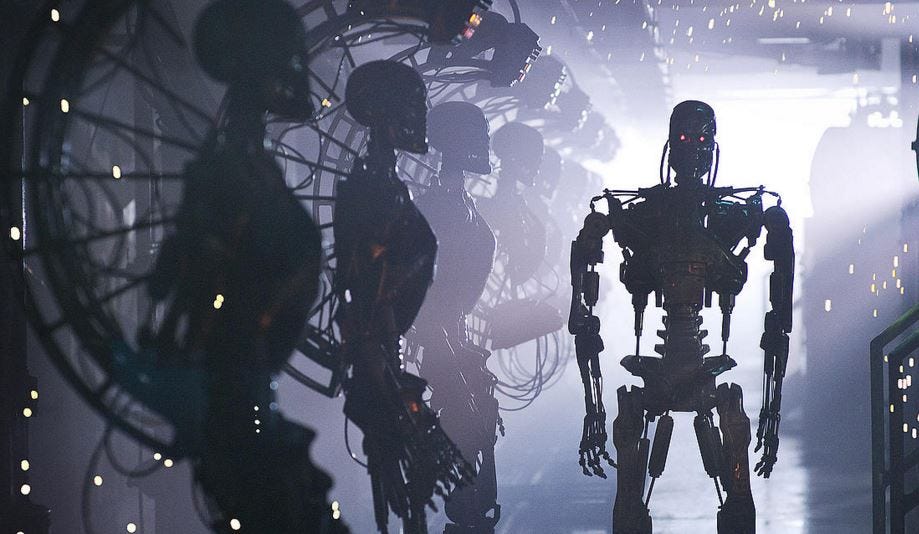Appendix B: A Caveat: The Rise of a Self-Perpetuating Capitalist Matrix
A scenario likely worse than a deliberately controlled central bank system
This Appendix provides a caveat to the willpower behind the central bank system as established in Goals, Motivations and Strategies of the Owners of Modern Society.
The introduction of this central bank system and its gradual propagation over multiple hundreds of years - to the point where it controls all institutions of power and is maximizing personal and governmental debt levels - raises questions about how much and to what extent this system has, over time, developed a kind of mind of its own. How much control do fifteenth generation central bank owner descendants have over a system that was developed, established and made long-lasting by their ancestors long before they were born? To what extent are these people simply riding trends and structures that have been established and reinforced by their forebears?
Fabio Vighi, Professor of Critical Theory and Italian at Cardiff University, UK, argues that due to technological advancement the system has become de-facto self-perpetuating, and that it is mindlessly evolving toward totalitarianism to account for industrialization and AI trends which are in the process of making most jobs obsolete. In other words, as wealth further concentrates in the hands of the ultra rich and the masses are left jobless and in poverty in a kind of neo-feudalism, the system will have to institute permanent lockdowns and remove freedoms (such as via upcoming CBDCs) under whatever pretexts are necessary in order to maintain social stability and lessen the effects of inflation from endless monetary printing by tampering demand, regardless of whether the central bank owners want it or not:
It is no longer the classic swing between boom and bust, or a financial cycle ending in a “Minsky moment”, for we have reached the absolute limit to capitalist expansion. It is important to reiterate that we are facing systemic implosion, not a crisis engineered by evil bankers motivated by sadism and greed. While the latter are the main attributes of the capitalist drive as such – since capital is nothing but a perverse end in itself – the current implosion reflects the historical exhaustion of the value-creating substance of capital; the fact that the fundamental ingredient of value itself – labour – is vanishing irreversibly while automated (technological) productivity takes off. It should be enough to observe that in a healthy capitalist economy the price of labour would rise. Instead, labour has been devalued for decades, which dramatically confirms that any monetary boost to the economy is without value substance, and destined to cause further misery. It is therefore inevitable that, at some point soon, capitalist reproduction will be brought back to the ground through the severe contraction of insubstantial masses of money (“bubbles”). Fictitious liquidity, created without any basis in real production, will be violently debased.
According to Vighi, the elites in charge of society are arrogant and do not understand the extent at which the reproduction of the capitalist matrix invisibly motivates their thoughts and behavior, and that, like Frankenstein and its monster, it may have unexpected and tragic consequences:
Those sitting in the control room fail to realize the extent to which their dominance is uncertain. What they do not see is that their authority depends on a ‘higher mission’, to which they remain partly blind, namely the anonymous self-reproduction of the capitalist matrix. Today’s power lies with the profit-making machine whose only purpose is to continue its reckless journey, potentially leading to the premature extinction of Homo sapiens….And the novelty of our era is that the ‘locked-down society’ is the model that best guarantees the reproducibility of the capitalist machine, irrespective of its dystopian destination.
The extent to which the central bank owners are consciously directing this process at this advanced stage (as opposed to earlier stages when their actions were clearly deliberate) is unknown, but it would be worse if the system has become self-replicating because it would mean that power has become so diffuse that there is no one in charge; humanity hurtling toward the end-game abyss of a ruthless capitalistic process for which no one knows the endpoint and no one to press the breaks if it gets out of hand. A horrible idea from which nightmares are made.

In the foreword to the George Schwab translation of Carl Schimtt’s Political Theology, Tracy B. Strong argues that Schmitt also foresaw the extreme dangers of technological society becoming self-replicating:
Schmitt, with explicit reference to Max Weber, sees danger in the increasing sense of the State as “a huge industrial plant” (PT, 65). Increasingly this plant “runs by itself… [and] the decisionistic and personalistic element in the concept of sovereignty is lost” (PP, 48). For Schmitt, this is a developmental process. As he lays it out in the Barcelona lecture, the history of the last 500 years in the West shows a common structure, even though as the controlling force has changed, so also has what constitutes evidence, as well as social elite. Thus in the sixteenth century the world was structured around an explicitly understanding with God and the Scriptures as foundational certainties; this was replaced in the next century by metaphysics and rational (“scientific”) research and in the eighteenth by ethical humanism, with its central notions of duty and virtue. In the nineteenth century economics comes to dominate…and, finally, in the twentieth century technology is the order of the day. And this is at the core of his claim that ours is an age of “neutralisation and depoliticization”: whereas all previous eras had leaders and decision makers, the era of technology and technological progress has no need of individual persons….
The point of [Schmitt’s] analysis of the centrality of the exception for sovereignty is precisely to restore, in a democratic age, the element of transcendence that had been there in the sixteenth and even the seventeenth centuries— Hobbes, Schmitt believes, understood the problem exactly. Failing that, the triumph of non-political, inhuman technologizing will be inevitable.
Ted Kaczynski also agrees that the advance of technology may usurp the power of the humans nominally in control of the system:
By that time it will have to have solved, or at least brought under control, the principal problems that confront it, in particular that of “socializing” human beings; that is, making people sufficiently docile so that heir behavior no longer threatens the system. That being accomplished, it does not appear that there would be any further obstacle to the development of technology, and it would presumably advance toward its logical conclusion, which is complete control over everything on Earth, including human beings and all other important organisms. The system may become a unitary, monolithic organization, or it may be more or less fragmented and consist of a number of organizations coexisting in a relationship that includes elements of both cooperation and competition, just as today the government, the corporations and other large organizations both cooperate and compete with one another. Human freedom mostly will have vanished, because individuals and small groups will be impotent vis-a-vis large organizations armed with super-technology and an arsenal of advanced psychological and biological tools for manipulating human beings, besides instruments of surveillance and physical coercion. Only a small number of people will have any real power, and even these probably will have only very limited freedom, because their behavior too will be regulated; just as today our politicians and corporation executives can retain their positions of power only as long as their behavior remains within certain fairly narrow limits.
The psychological aspect of this phenomenon is explored and reformulated by Zero HP Lovecraft based on an argument from political dissident and later president of Czechoslovakia Vaclav Havel, which ties (1) elite motivations to stay in power along with (2) their ultimate powerlessness where they have to meet the changing needs of the system or be cast out from power, along with (3) the increasing structural incentives toward a virtue signaling spiral leading to the leftist singularity, as described earlier in this essay:
The elites and the masses hold each other hostage.
This is going to be a brief reformulation of an argument from Vaclav Havel.
In the post-totalitarian world, the center of power becomes identical with the center of truth. That is to say, those people who are in power determine what is true, regardless of reality, and to be subject to power is to live within its understanding of truth.
Ideology becomes an increasingly core component of power, which provides it with both legitimacy and coherence. The significance of phenomena no longer derived from the phenomena themselves, but from their locus within the ideological context.
Power and ideology begin to serve each other in an increasingly vicious feedback loop, whereupon ritual itself, the ritualistic obedience to ideology, becomes the dictator, rather than any individual. Power becomes anonymous and leaders become interchangeable.
Any person who fails to perform the rituals of ideological power is immediately ousted from the system. By performing these rituals, each person in the grip of the ideology compels others to accept the rules of the game and confirm the power which requires the rituals in the first place.
Each person helps the other to be obedient, becoming both victims and instruments of the ideology. Everyone, at every level, from the shop-keepers to the prime minister, is involved and enslaved. By pulling everyone into its power structure, the post-totalitarian system makes everyone an instrument of the auto-totality of society.
This is Havel’s argument. And Havel notes that there may be a degree of reluctance or even unwillingness in the complicity of the people with the post-totalitarian system of the ideology that grips them. Indeed, they may inwardly resist on some level. But in the post-totalitarian society, the higher your place in the hierarchy, the greater price of obedience and loyalty the ideology demands.
The people with the most power in the progressive system have the least freedom. They only have the power to do what the progressive ideology demands of them, and the moment they are insufficiently compliant, everyone else around them rushes in to fill the void.
It might be fair to say that, at the highest echelons of ideological power, the people there have moved beyond sincerity and cynicism, and having transcended this dichotomy, their only principle is to be fully instrumentalized by the ideology.
In other words, if the ideology demands pride parades, then they will believe that instituting pride parades is the moral thing to do, because there is no daylight between the demands of power and the progressive moral understanding.
When the hoi polloi accuse progressive leaders of cynicism, what they are really saying, and it’s a very shallow, contemptible utterance, honestly, is that they believe themselves to be even more moral than their leaders, even more dedicated to the moral understanding of power than the powerful.
Scott Alexander…called this the fifty Stalins argument. One wishes to criticize Stalin, but the penalty for doing so is life imprisonment in a camp. The only allowable way then to express dissent is to say:
“Stalin, he is good, but he is not enough. What we need is fifty stalins!” This is what the progressive does when she accuses woke corporate leaders of being cynical.
She doesn’t realize she is doing this. It’s all perfectly instinctive, to complain in a way that is safe and meaningless, in a way that, if it were taken seriously, would empower the powerful even more.
And the act of saying it causes her to believe what she is saying. This is how public declarations work, psychologically. When you make a statement publicly, it causes you to adjust your own belief of yourself, to think that the thing you have said is your real belief.
No one is immune to this kind of social pressure from within.
Havel had warned that Soviet totalitarianism was only “‘an extreme manifestation…of a deep-seated problem that also finds expression in advanced Western society.’ For ‘there too, there is a trend toward impersonal power and rule by mega-machines or Colossi that escape human control.’ He added that these ‘juggernauts of impersonal power, whether ‘large-scale enterprises or faceless governments, represent the greatest threat to our present-day world.’”1

Being on the outside of central bank owner motivations, deliberations and strategies and having to piece it together piecemeal, it is impossible to say to what extent this self-perpetuating capitalist or technological matrix has superseded the power and control of the central bank owners. It certainly looks like their conspiracy continues apace with few if any signs of disquiet from the outside. That being said, this Appendix was necessary to add to properly Steelman a potential critique.
For a deeper dive into this topic, see this interview with Vighi on Youtube.
Conquest, 212.






"whereupon ritual itself, the ritualistic obedience to ideology, becomes the dictator".
The dictator is core human nature. The rituals, ideologies, ... are products of that.
What is the end game? Well you see, they (transnational deep state / Mr Global / G3P) don’t actually have one. They just want to keep kicking the can down the road in the 500 year road to ruin since usury was allowed by the Catholic Church.
So let’s count the reasons why they will lose:
* Their plan to enclose all the commons down to the molecular level is batshit crazy
* They are outnumbered by a factor of 1,000,000/1 => 8 billion/maybe 8,000
* They can’t control the flow of information and this is now proven
* They have no long term goal besides extending their reign
The Banksters Will Lose The 500 Year Battle
https://tomg2021.substack.com/p/the-banksters-will-lose-the-500-year